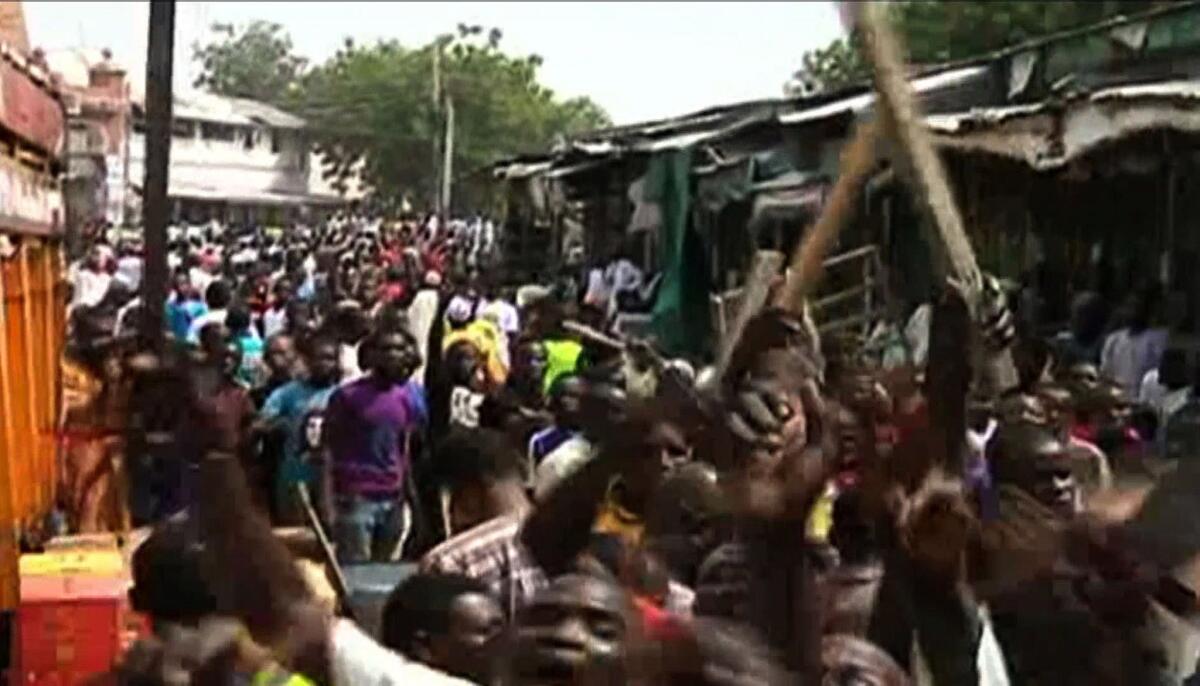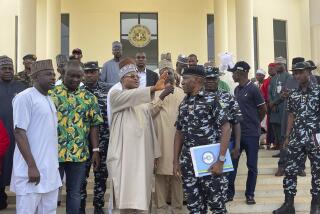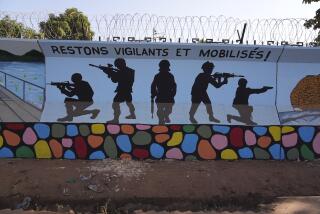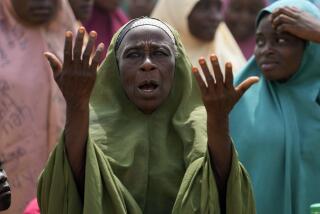Two female suicide bombers kill more than 40 at Nigerian market

Two teenage girls wearing suicide belts blew themselves up in a market in northern Nigeria on Tuesday, killing more than 40 people, authorities said. It was the latest in a string of horrific attacks in Nigeria for which Islamist militants are blamed.
The day before, dozens were killed in Damasak, a town on the border with Niger, when insurgents disguised as traders attacked the local market, gunning down people seemingly at random in a style of attack that has become commonplace in northeastern Nigeria.
Days before that, suspected militants killed 48 fish traders from a village near Lake Chad.
There has been little response to the attacks from the Nigerian military.
The latest attack, involving the two teenagers, took place in the Borno state capital of Maiduguri.
Mohammed Abbas Gava, head of a community vigilante militia in the city, said the first girl detonated hidden explosives, killing about three women. When a crowd gathered, the second teen blew herself up, killing dozens.
Female suicide bombings are relatively rare, although not unheard of, in Nigeria, parts of which have been besieged by a militant Islamist group known as Boko Haram.
In northern Nigeria, militants routinely set up roadblocks, looting convoys of goods and ordering people out of cars and killing them.
Terrified remote communities in the northeast of the country are most vulnerable, and dozens have fallen to Boko Haram or violent splinter factions that have made significant territorial gains in recent months.
Most of the victims are men or schoolboys, including breadwinners who leave families with no means of support.
In Monday’s market attack in Damasak, the attackers wore civilian clothes, and came to town carrying boxes, typical of those used by traders. Instead, they pulled out automatic weapons and started shooting, a local official told the Agence France-Presse news agency.
Doron Baga, a small town near Lake Chad, saw a chilling attack last week when Boko Haram set up a roadblock and stopped a convoy of fish traders, killing at least 48 men, according to local officials.
Fishermen in the region used to make a living fishing in Lake Chad, but have abandoned the job in recent months because of frequent attacks, instead driving to Chad, where they import dried fish to sell. They travel by convoy to discourage attacks.
The roadblock was on the last road in the area that had been free of Boko Haram attacks, and was considered the only safe one, according to Abubakar Gamandi, chairman of the local branch of the Nigeria Union of Fisherman and Seafood Sellers.
In a phone interview, Gamandi said dozens of insurgents barricaded the road Nov. 20, stopped the fish traders, cut their throats and beheaded many.
News of the attack took days to filter out because many cellphone towers in northeastern Nigeria have been destroyed by Boko Haram, which is bitterly opposed to Western culture, including taxes, democracy, ATMs for banking, and secular Western-style education. The group, which abducted nearly 300 schoolgirls from the northeastern town of Chibok in April, is fighting to impose a strict Islamic state across northern Nigeria.
No group claimed responsibility for the attack, but it was believed to be the work of Boko Haram or a similar militant group.
“Dozens of Boko Haram insurgents barricaded the road at Dogon Fili near Dabar Wanzam village around noon and forced a convoy of fish traders to stop,” Gamandi said. “They killed their victims silently,” with knives, not guns, he said.
“Those who didn’t die from being stabbed or having their throats cut were tied up and thrown into the lake to drown,” Gamandi added.
In Doron Baga, troops from Nigeria, Chad and Niger are stationed to fight Boko Haram. Gamandi said the attackers may have avoided using guns to keep security forces from responding.
“The fishermen were forced out of their vehicles at gunpoint by Boko Haram terrorists, who began to slaughter them one after the other,” said Gava, the head of the Maiduguri vigilante group set up to resist Boko Haram attacks. “They slaughtered 48 of the fishermen. Our vigilantes found their bodies by the side of the lake. Eight more corpses were found floating in the water and retrieved.”
He said the militants had tied the hands and legs of the eight before throwing them in the lake.
Respected Islamic leader Muhammad Saad Abubakar, the sultan of Sokoto, criticized Nigeria’s military for fleeing attacks or failing to respond.
“Nigeria’s sovereignty has been threatened, as a so-called Islamic caliphate has been carved out by the insurgents,” he said in a statement to local media. “An unfortunate, worrisome and embarrassing dimension has recently been added to the scenario: the way soldiers take to their heels and abandon their bases, arms, ammunition and other military hardware on the approach of the insurgents.”
Abubakar called it a “sad and unfortunate fact that Nigerian security forces only surface after the deadly attacks,” adding that they terrorize people by installing roadblocks and searching homes and businesses.
A Nigerian military spokesman, Chris Olukolade, dismissed criticism that terrorists had overwhelmed the military in the country’s northeast. He said the fight was not conventional warfare, with militants mounting sporadic guerrilla attacks before melting away.
Special correspondent Abubakar reported from Kano, Nigeria, and Times staff writer Dixon from Melbourne, Australia.
Follow @RobynDixon_LAT for news from Africa
More to Read
Start your day right
Sign up for Essential California for news, features and recommendations from the L.A. Times and beyond in your inbox six days a week.
You may occasionally receive promotional content from the Los Angeles Times.






